Life of David Hume | Philosophy - Peak Intrigue #philosophy
The Life of David Hume:
Today, we will be exploring the fascinating ideas of David Hume, one of the most influential philosophers of the 18th century. David Hume was born in Edinburgh, Scotland in 1711 and lived until 1776. He is widely regarded as one of the most important figures in the Scottish Enlightenment and is known for his radical ideas about human nature, skepticism, and causation.
Hume began his studies at the University of Edinburgh when he was only 12 years old. He was an avid reader and spent much of his time reading works by philosophers like John Locke and René Descartes. Later, he attended the University of Glasgow, where he studied under Francis Hutcheson, who was a major influence on his thinking.
After finishing his studies, Hume spent several years in France, where he wrote his first major work, "A Treatise of Human Nature," which was published in 1739. In this work, Hume explored the nature of human understanding and argued that our beliefs are based on our experiences and impressions of the world around us.
Hume believed that there are two types of knowledge: relations of ideas and matters of fact. Relations of ideas are things that are necessarily true, like mathematical propositions, while matters of fact are things that can only be known through experience, like the color of a flower or the taste of a fruit.
One of Hume's most famous arguments is his critique of causation. Hume believed that causation is not a necessary relation between events, but rather a habit of the mind that arises from the constant conjunction of two events. In other words, we infer that one event causes another because we have observed them occurring together repeatedly in the past. However, this does not prove that there is a necessary connection between the two events.
Hume was also a skeptic when it came to religion. He argued that we have no reason to believe in miracles, since they go against the laws of nature. Hume believed that we should rely on reason and empirical evidence to understand the world, rather than accepting things on faith.
In addition to his philosophical work, Hume was also involved in politics. He worked as a librarian for the Faculty of Advocates in Edinburgh and was appointed secretary to the British embassy in Paris in 1763. However, his tenure was short-lived, as he resigned in 1766 due to poor health.
Hume was also an avid historian and wrote several works on the history of England. His most famous work in this area is "The History of England," which covers the period from the Roman invasion to the Glorious Revolution of 1688.
Despite his contributions to philosophy and history, Hume's ideas were controversial in his time. Many people saw his skepticism and atheism as a threat to religion and morality. However, his ideas were highly influential in the development of empiricism and skepticism, and they continue to be studied and debated today.
In conclusion, David Hume was a Scottish philosopher who lived in the 18th century and is known for his radical ideas about human nature, skepticism, and causation. He believed that our beliefs are based on our experiences and impressions of the world around us, and that we should rely on reason and empirical evidence to understand the world. Hume was also an avid historian and wrote several works on the history of England. Despite being controversial in his time, his ideas have had a lasting impact on philosophy and continue to be studied today.
#philosophy #davidhume #motivation
-
 3:25
3:25
PeakIntrigue
1 year agoRené Descartes | 3-Minute Philosophy | Peak Intrigue #philosophy
169 -
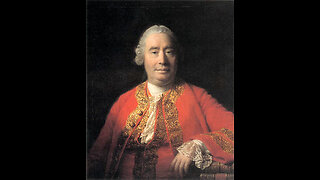 55:55
55:55
Convincing Proof
1 year agoDavid Hume (Intro to Philosophy Part 6)
32 -
 1:02:03
1:02:03
The Underground Man
8 months agoAncient Greek Philosophy - Philos-Sophia - The Pursuit of Wisdom & Truth - Greek Philosophers
342 -
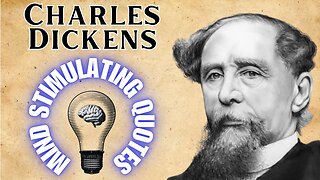 3:27
3:27
StimulatingShakespeare
1 year ago10 Inspirational Charles Dickens Quotes That Show You How to Live with Passion, Purpose & Prosperity
16 -
 3:27
3:27
Sapiential Sage
9 months ago10 Inspirational Charles Dickens Quotes That Show You How to Live with Passion, Purpose & Prosperity
73 -
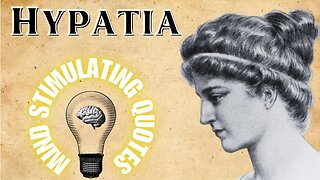 3:17
3:17
StimulatingShakespeare
11 months agoChallenge the Status Quo: Hypatia's Profound Quotes on Thinking, Truth, and Freedom!
32 -
 3:25
3:25
Sapiential Sage
10 months agoThe Brilliance of Benjamin Disraeli: 10 Quotes to Inspire & Motivate Your Life's Purpose
21 -
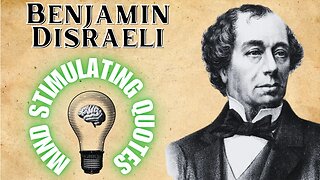 3:25
3:25
StimulatingShakespeare
1 year agoThe Brilliance of Benjamin Disraeli: 10 Quotes to Inspire & Motivate Your Life's Purpose
10 -
 3:35
3:35
Sapiential Sage
9 months agoStep into a Magical Realm with these 10 Profound Quotes by C.S. Lewis that Will Expand Your Horizons
50 -
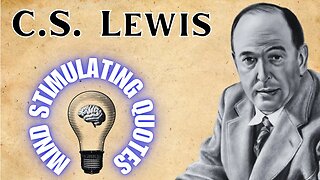 3:35
3:35
StimulatingShakespeare
1 year agoStep into a Magical Realm with these 10 Profound Quotes by C.S. Lewis that Will Expand Your Horizons
15